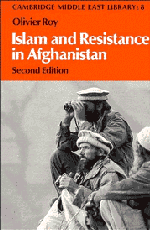Book contents
- Frontmatter
- Contents
- Acknowledgements
- Maps
- Introduction
- 1 State and society in Afghanistan
- 2 Islam in Afghanistan
- 3 The origins of Afghan fundamentalism and popular movements up to 1947
- 4 The Islamist movement up to 1978
- 5 The communist reforms and the repression, 1978–9
- 6 The uprisings, 1978–9
- 7 The establishments of political parties
- 8 The development of the parties between 1980 and 1984
- 9 The role of the Shiʿa in the resistance
- 10 Society and the war
- 11 From freedom fighter to guerilla
- 12 Military operations
- 13 The conflict from 1986 to the Soviet withdrawal
- 14 Cultural patterns and changes in society: an assessment
- 15 Afghan politics and the outside world
- Appendixes
- Notes
- Bibliography
- Index
4 - The Islamist movement up to 1978
- Frontmatter
- Contents
- Acknowledgements
- Maps
- Introduction
- 1 State and society in Afghanistan
- 2 Islam in Afghanistan
- 3 The origins of Afghan fundamentalism and popular movements up to 1947
- 4 The Islamist movement up to 1978
- 5 The communist reforms and the repression, 1978–9
- 6 The uprisings, 1978–9
- 7 The establishments of political parties
- 8 The development of the parties between 1980 and 1984
- 9 The role of the Shiʿa in the resistance
- 10 Society and the war
- 11 From freedom fighter to guerilla
- 12 Military operations
- 13 The conflict from 1986 to the Soviet withdrawal
- 14 Cultural patterns and changes in society: an assessment
- 15 Afghan politics and the outside world
- Appendixes
- Notes
- Bibliography
- Index
Summary
The phenomenon of Islamism in Afghanistan is of recent origin and owes more to the Egyptian Muslim Brothers than to Indian fundamentalism (in spite of the importance of Maududi). While it stands within the fundamentalist tradition, it nevertheless represents a complete break from Afghan cultural tradition. The Islamists are intellectuals, the product of modernist enclaves within traditional society; their social origins are what we have termed the state bourgeoisie – products of the government education system which leads only to employment in the state machine. Except for the group of “professors” in the faculty of theology, they do not consider themselves to be scholars (ʿulama) but as intellectuals (roshanfikr).
The Islamists are almost all products of the government education system, either of the scientific schools, or of the state madrasa. Very few of them have had an education in the Arts. On the campus, they mostly mix with the communists, to whom they are violently opposed, rather than with the ʿulama, towards whom they have an ambivalent attitude. They share many basic beliefs in common with the ʿulama (Qurʾan, sunnat, etc.), but Islamist thought has developed from contact with the great Western ideologies, which they see as holding the key to the West's technical development. For them, the problem is to develop a modern political ideology based on Islam, which they see as the only way to come to terms with the modern world and the best means of confronting foreign imperialism.
- Type
- Chapter
- Information
- Islam and Resistance in Afghanistan , pp. 69 - 83Publisher: Cambridge University PressPrint publication year: 1990

